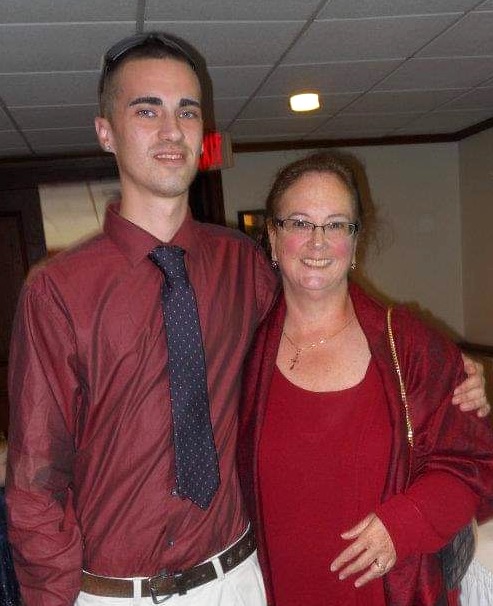
Peer Grief Helper Profile: Kathryn Stygles Peirce
By Kerry J. Bickford, VOICES Editor
In 2017, Kathryn Peirce was approached by Natick 180, “a community coalition that brings together a wide range of people and resources from around Natick to address the factors that contribute to addiction.” They asked if she would be interested in sponsoring an overdose grief support group and offered to provide a place to meet. After losing her oldest son in 2013 to what she describes as a “cocktail of heroin and fentanyl” and spending four long years attempting to connect to local groups like SOAR Natick, Kathryn was compelled to start a group that would specifically support those who have lost a loved one to overdose, like she had. And so began her journey as a peer support helper, a journey that has grounded and connected her to the SADOD community.
Tristan Peirce was an “old soul” and though “he was not the greatest student,” he captivated those around him with his quick wit and the “gift of gab.” People liked him because he was polite and he made them laugh. He played baseball and football, and he loved cars. Because he was not an enthusiastic reader, his mother encouraged him by purchasing books that were motivating -- like a book on cars that he not only read, but memorized and quoted from verbatim for months. There often is a very bright mind obscured by a learning disability, and that was the case with Tristan.. By the time he was diagnosed with ADHD at age 16 and prescribed medication to help with this, he seemed to have lost confidence. Still, he persevered and graduated in 2008, but that was the beginning of his first downward spiral as he juggled self-medication with bad decisions. He began hanging out with a questionable crowd, which resulted in legal problems, and as one thing led to another, he inevitably made the deadly decision to begin using heroin.
Like most parents do when they realize their child is in trouble, Kathryn and her husband rallied behind Tristan and were there to support him during detox, rehab and relapse. He spent time in several halfway houses including Hope House and North Cottage, after which he was finally able to get a job as a machinist in Holliston. Kathryn drove him to and from work every day and tried to support her son as he attempted to put his life back together -- one day at a time. He met a young woman who eventually moved in with him, and they began looking for rings. Things seemed to be heading in a positive direction, and he even confided “I’ve got everything to live for Mom.”
This made it more difficult -- even unbelievable -- to understand what happened next. When they couldn’t wake him up from a nap one afternoon, they realized Tristan was in trouble. He was still breathing when he was rushed to the hospital, but he was placed on life support. The kid who had “everything to live for” stepped into the deadly trap of relapse -- and this time there was no coming back. He died a few days later on September 7, 2013.
It’s not easy to find support after an overdose death. Kathryn soon realized this when she attended a group that supported addiction recovery in her town, but felt she was the other parents’ “worst nightmare.” As it turned out, two of Tristan’s friends also died soon after he did, and she was able to “talk and cry” with their mothers in a way she couldn’t do with the other group.
Her sister encouraged her to get involved in the FED UP! rally that same year, and she found herself driving to Washington, D.C. where she met a whole new group of people, who, like her, had lost loved ones to overdose. She continued to do this for the next few years, and to stay in touch with people she met at the rally. It was during this time that Kathryn recalls realizing “this isn’t just happening to me, it's happening everywhere.”
By the time she was approached by Natick 180 in 2017, Kathryn was ready to take action. She and her friend, Stephanie, began facilitating the group, and were grateful for the determination of Natick 180 and SOAR -- who not only provided support and space for these meetings, but who also arranged a retreat with a psychic, art therapy, meditation, yoga and nutritious meals for the new group The Journey.
As other peer helpers have described, these mutual support groups are as much about giving as they are about receiving from others who have witnessed the excruciating pain of living through and with addiction. Peer helpers can relate to what loved ones are describing because they have been there themselves. As Kathryn noted, “I get so much out of it, no matter how I’m feeling.”
It took Kathryn a while before making the decision to become a peer helper. David Kessler said in The Sixth Stage of Grief: Finding Meaning, “there comes a point when we want to honor our loved ones with something more than sadness,” and this is what inspires us to take on a role like this one, to open a nonprofit for addiction recovery, -or to raise money to help with addiction and recovery. We never know when we will enter that sixth stage, but it is transformational in the healing process and helps create meaning in our lives as we journey on without the ones we so dearly love and miss.
For Kathryn, The Journey: Living With Loss From Substance Abuse became the full name of her support group and symbolic both of how far she has come and how far she will go while carrying her love for Tristan in her heart and a message of healing as her compass.
